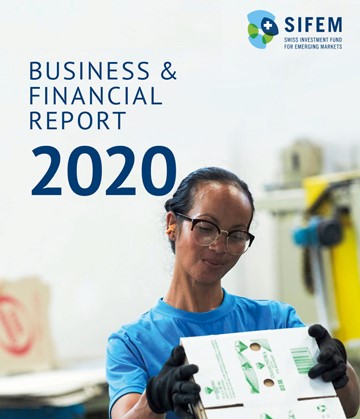Menu
In 2020, the Swiss Investment Fund for Emerging Markets (SIFEM) committed a total of USD 85.6 million to ten new investments and concluded the year with a negative operating result of CHF -28.6 million, amid the global COVID-19 crisis. More than ever, SIFEM has been able to play its counter-cyclical role and has continued to invest with a long-term view despite the short-term uncertainties associated with the current crisis. All the more, SIFEM is pleased to report that it has met 30 out of 31 targets set by the Federal Council for the strategic period 2018-2020. As for the SIFEM Board, Dr Dominique Biedermann, who has distinguished himself as a long-time champion of the cause of good governance in companies, has been elected as a new Board member.
In 2020, the Swiss Investment Fund for Emerging Markets (SIFEM) committed a total of USD 85.6 million to ten new investments and concluded the year with a negative operating result of CHF -28.6 million, amid the global COVID-19 crisis. More than ever, SIFEM has been able to play its counter-cyclical role and has continued to invest with a long-term view despite the short-term uncertainties associated with the current crisis. All the more, SIFEM is pleased to report that it has met 30 out of 31 targets set by the Federal Council for the strategic period 2018-2020. As for the SIFEM Board, Dr Dominique Biedermann, who has distinguished himself as a long-time champion of the cause of good governance in companies, has been elected as a new Board member.
At the end of 2020, SIFEM, the Development Finance Institution (DFI) of the Swiss Confederation, posted a negative operating result of CHF -28.6 million. This result comes amid the global COVID-19 crisis whose economic and social costs have been severe due to the absence of large-scale safety nets for people and businesses in most emerging markets and developing countries. SIFEM’s operating result for 2020 reflects the severity of the current global crisis, which has led to a substantial decrease in the market valuation of the existing assets in the portfolio compared to last year. This should at least be partially recovered with the expected improvement of the world economy. SIFEM’s investees have generally held up to the crisis and have shown remarkable resilience. To be sure, financial reflows have remained strong, being only slightly below last year’s results, which is encouraging.
Ten new investments
In 2020, SIFEM committed a total of USD 85.6 million to ten new investments, of which USD 12.8 million were dedicated to emergency liquidity facilities to respond to the COVID-19 crisis. The new commitments include six investments in private equity funds that support SMEs and other fast-growing businesses in Sub-Saharan Africa and Latin America, one loan to a financial institution targeting SMEs in Southeast Asia, and three COVID-19 related investments, which are also targeting SMEs.
SIFEM’s Chairman, Jörg Frieden, highlighted the crucial role played by Development Finance Institutions (DFIs) in the context of the crisis: “At a time when private capital flows to developing countries have declined, Development Finance Institutions act counter-cyclically, accepting higher risks and absorbing short-term losses. They are determined to collaborate closely and participate in rebuilding local economic fabrics and to promote sustainable growth very much in line with the new mandate defined for SIFEM by the Federal Council and the Paris Agreement objectives.”
Strategic objectives
SIFEM is pleased to report that it has met 30 out of the 31 targets and sub-targets set by its shareholder, the Federal Council, for the strategic period 2018-2020. All development objectives have been met or exceeded, but the result of the financial objective has been impacted by the health and economic crisis of 2020. The Board of Directors considers this to be an excellent result, given the adverse external environment associated with the crisis.
New Board member
At the SIFEM Annual General Meeting on 11 May 2021, the Business and Financial Report 2020 and the audited Financial Accounts 2020 were approved. Regine Aeppli has decided to withdraw from the SIFEM Board, of which she has been a member since 2017. The SIFEM Board would like to thank Mrs Aeppli for her strong and unfailing commitment to SIFEM’s work over the past years. Dr Dominique Biedermann has been elected as her successor. For decades, Dr Biedermann has distinguished himself as an advocate of good governance in Swiss companies and as a promoter of socially responsible investments. He was co-founder of the Ethos Foundation and Ethos Services and was their CEO until 2015. Since 2015, Dr Biedermann has held leading roles in different organisations, including that of member of the Board of Directors of the Federation of Migros Cooperatives. He has also been a lecturer at the University of Neuchâtel and provided consulting mandates for various institutions.

SIFEM contributes USD 15 million to the fund allowing it to reach target fund size and supporting infrastructure and climate projects in Colombia and Peru.
SIFEM contributes USD 15 million to the fund allowing it to reach target fund size and supporting infrastructure and climate projects in Colombia and Peru.